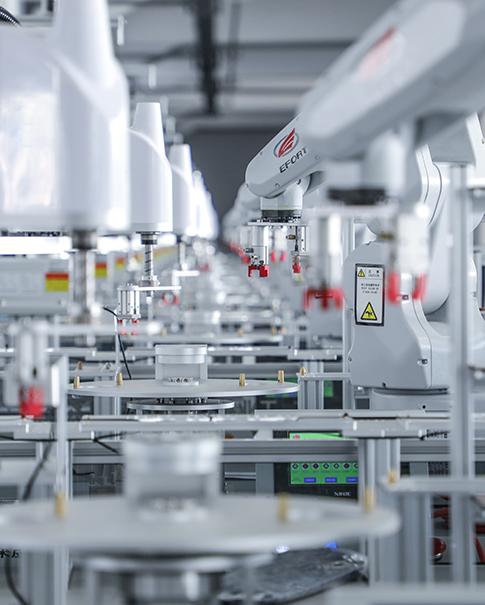At a time when the digital economy is booming, artificial intelligence (AI) is sweeping the world at a rapid pace and has become the core force driving changes in various industries. Under the impact and empowerment of the AI wave, the automation industry is accelerating its transformation to intelligence, injecting new vitality into the development of the manufacturing and industrial fields, and opening a new chapter in the development of the industry.
Perception decision-making upgrade: AI gives automation equipment "smart eyes and brain"
Traditional automation equipment is like a "mechanical executor" that can only work according to preset programs and lacks the ability to perceive and respond to complex environments. The integration of AI technology has completely changed this situation. AI technologies such as computer vision and natural language processing have given automation equipment "smart eyes and brains". In the field of electronic manufacturing, automated inspection equipment equipped with AI visual recognition systems can identify welding defects and dimensional deviations of tiny electronic components with extremely high accuracy. Compared with traditional manual inspection, the efficiency is increased by more than 5 times, and the defect detection rate is increased to more than 99%, effectively ensuring product quality.
Data analysis and prediction: Equip the automation system with a "smart decision-making center"
AI's powerful data analysis and prediction capabilities have become the key to optimizing decisions in automation systems. By analyzing the massive amounts of data generated during the production process in real time, AI algorithms can predict equipment failures in advance, optimize production processes, and accurately allocate resources. A world-renowned home appliance manufacturer uses AI technology to analyze the vibration, temperature and other data of equipment on the production line, build a fault prediction model, and increase the accuracy of equipment preventive maintenance by 60%, reduce equipment downtime by 40%, and save more than 10 million yuan in maintenance costs each year. At the same time, AI can also automatically adjust production plans based on market sales data, user feedback and other information to achieve accurate matching of product supply and demand.
Collaborative innovation and development: The industrial chain jointly builds an intelligent transformation ecosystem
The wave of AI is driving collaborative innovation among upstream and downstream companies in the automation industry chain. With its strong AI algorithm research and development capabilities, technology giants have worked closely with automation equipment manufacturers to jointly create intelligent solutions. For example, Google's DeepMind collaborates with industrial robot companies to apply reinforcement learning algorithms to robot control, enabling robots to autonomously learn operating skills in complex assembly tasks and quickly adapt to the assembly needs of different products. At the same time, colleges and research institutions focus on the intersection of AI and automation, carry out cutting-edge technology research, provide a large number of professional talents for the industry, accelerate the transformation of technological achievements, and jointly build an ecosystem for intelligent transformation.
Enterprises take positive actions: intelligent transformation becomes a new development trend
Changes in market demand have prompted enterprises to embark on the road of intelligent transformation. With the help of cloud computing, edge computing and other technologies, small and medium-sized enterprises have introduced AI automation solutions at a relatively low cost. For example, a small clothing manufacturing company has deployed an intelligent cutting system and used AI algorithms to optimize fabric layout, reducing fabric waste by 15%, significantly reducing production costs. Many startups have also targeted niche markets and launched special intelligent automation products. For example, companies focusing on agricultural automation have developed intelligent irrigation robots equipped with AI technology, which can automatically adjust irrigation volume according to soil moisture and crop water requirements, helping agriculture achieve precision production.
Challenges and opportunities coexist: thorns and dawn on the road to transformation
Although the prospects for intelligent transformation are broad, the automation industry still faces many challenges. Data security and privacy protection issues are particularly prominent. After the integration of automation systems and AI technologies, the collection and processing of a large amount of sensitive data puts companies at risk of data leakage. At the same time, AI technology is highly professional and updated quickly, resulting in a shortage of professional talents in the industry, and companies face difficulties in technology implementation and employee training. However, challenges and opportunities coexist, and the process of solving these problems will also become a source of power for innovation and development in the industry.Email us
Reply within one working dayVisit us
32D Guomao Building, No.388, Hubin South Road, Siming DistrictDisclaimer : Salesplc sells new and surplus products and develops channels for purchasing such products. This website has not been approved or recognized by any of the listed manufacturers or trademarks. Salesplc is not an authorized distributor, dealer, or representative of the products displayed on this website. All product names, trademarks, brands, and logos used on this website are the property of their respective owners. The description, explanation, or sale of products with these names, trademarks, brands, and logos is for identification purposes only and is not intended to indicate any association with or authorization from any rights holder.
Copyright @2024 SalesPlc Limited. Sitemap
/ Blog
/ XML
/ Terms And Conditions
/ Privacy Policy
 Network Supported
Network Supported
